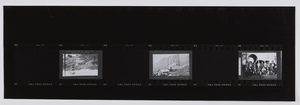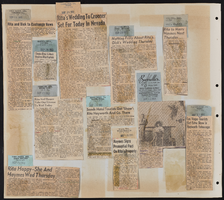Search the Special Collections and Archives Portal
Search Results

Congregation Ner Tamid roundtable oral history interview: transcript
Date
Archival Collection
Description
Oral history interview with the Congregation Ner Tamid roundtable conducted by Barbara Tabach on September 21, 2016 for the Southern Nevada Jewish Heritage Project. In this interview, Rabbi Sanford Akselrad and five members of the congregation discuss the founding of Congregation Ner Tamid, the first reform synagogue in Las Vegas, Nevada, in 1974. They go into detail on how the synagogue was formed, the building-hopping they did until they built their current structure, and the funding it took to get to that point. The interviewees reveal a few donors, such as Morris Dalitz and Frank Sinatra, who helped to build their synagogue and school. The interview ends with meaningful stories and memories the members have relating to Congregation Ner Tamid.
Text

Dr. Deborah Kuhls oral history interview: transcript
Date
Archival Collection
Description
Oral history interview with Dr. Deborah Kuhls conducted by Barbara Tabach on December 29, 2017 for the Remembering 1 October Oral History Project. In this interview, doctor Deborah A. Kuhls describes the preparation and procedures implemented at the University Medical Center of Southern Nevada (UMC) during the night of the October 1, 2017 mass shooting in Las Vegas, Nevada. She describes her experiences from that night and into the next morning, starting from when the trauma center first learned about the shooting to when patients began arriving. She goes into detail on the hospital's Military-Civilian Trauma System Partnership, which allowed for the installation of a second trauma area to treat the large volume of patients. In addition to the events at the hospital, Kuhls talks about the flurry of activities during the week of the shooting, including interviews with various media, the statewide meeting for surgeons, fellows, and residents where "stop the bleed" training was provided, and general meetings with various government officials, including Donald Trump. Deborah Kuhls also discusses the emotional impact of the shooting and its aftermath as well as her goals for the future of trauma in the medical field.
Text

Casiano Corpus Jr. oral history interview: transcript
Date
Archival Collection
Description
Oral history interview with Casiano Corpus Jr. conducted by Cecilia Winchell and Stefani Evans on February 14, 2023 for the Reflections: the Las Vegas Asian American and Pacific Islander Oral History Project. In this interview, Corpus Jr. details a difficult childhood in the Philippines, where society is highly socioeconomically stratified. He recalls his parents working a number of jobs to support their large family, and as soon as he finished his primary schooling, he also started working in construction. When his father was finally petitioned by his uncle to move to the United States, Corpus was at first reluctant to go, since he had a familiar life in the Philippines, but has come to love the United States and the life he created for himself. Immediately after moving to the United States, their family landed in Las Vegas, Nevada, and Corpus began working a number of jobs. He started out as a busboy at a Chinese restaurant before deciding that he wanted to work in a casino and moved to Union Plaza. His current job is as a porter at Palace Station, where he has been for the past 31 years. He has also been working to unionize Palace Station and Station casinos with the Culinary Union for the past twelve years. He talks about the hunger strike he organized, why he organizes with no fear, and what he hopes to see out of his efforts throughout the interview.
Text

Transcript of interview with Henry Kronberg by Barbara Tabach, February 26, 2015 and April 13, 2015
Date
Archival Collection
Description
Interview with Henry Kronberg by Barbara Tabach in two sessions, February 26 and April 13, 2015. In the first session Kronberg talks about his childhood in Germany and Poland and his experience being imprisoned by the Gestapo, and transported to a concentration camp. He survived the Holocaust and met his wife, and they moved to the United States in 1946. He discusses being reunited with his sister in Las Vegas after decades of searching, and moved his family to Las Vegas in 1962. Kronberg talks about becoming involved with Jewish life here, and his wife, Lillian's involvement at Temple Beth Sholom. In the second session, Kronberg discusses purchasing Stoney's, a loan and pawn shop, including some of the clientele and merchandise. He also discusses other social and environmental concerns like anti-Semitism and water resources in Southern Nevada.
Henry Kronberg was born in 1920 and spent his early childhood in a town on the border of Poland and Germany, about 40 miles from Krakow. For years he felt uncomfortable telling his story of surviving the Nazi concentration camps of World War II. Today his name is linked to the Sperling Kronberg Mack Holocaust Resource Center in Las Vegas. And in his soft-spoken manner, Henry recalls his ordeal of loss of family and survival during this most heinous of situations through backbreaking labor and ingenuity. At the end of the war, Henry met the love of his life, Lillian, also a survivor. The two married in 1946 in Frankfurt and immigrated to New Jersey where she had relatives. He describes their difficulties and the various jobs he held until becoming an excellent baker. Then in 1962 an interesting choice took him to a bar mitzvah in Canada. While there the dinner conversation lead him to a great discovery?his sister Lala had survived and was living in Las Vegas. Soon he moved his wife and daughter to Las Vegas. His first foray into business was with his brother-in-law. However, soon it was important to be independent and to control his own destiny. He purchased a going concern, Stoney's Pawn Shop, from Dr. Alexander Coblentz, one of the city's first doctors. He became the fourth owner of Stoney's and operated it until selling it to Steven Mack in 1998. Henry and his wife were active in the Jewish community. They joined Temple Beth Sholom and became fast friends with many of the early leaders of Las Vegas and became a respected member of the secular and Jewish communities.
Text
Temple Beth Sholom Records
Identifier
Abstract
The records of Temple Beth Sholom date from 1945 to 2015 and include scrapbooks, photographs, bulletins, meeting minutes, by-laws, correspondence, and publications. The collection contains documentation of the Board of Directors, the Sisterhood, the Men's Club, the history of the congregation, events held by the temple, and construction of the temple building in Summerlin in Las Vegas, Nevada.
Archival Collection
Ford, Jean, 1929-1998
Nevada politician and women's advocate Imogene "Jean" Young was born in Miami, Oklahoma, on December 28, 1929, to Daisy Adelphia (Flook) and Clarence Nathan Young. She had one brother, Byron Young. Her family moved to Joplin, Missouri, where she attended kindergarten through high school. In 1951 she graduated from Southern Methodist University in Dallas, Texas with a B.A. in Sociology. After graduation she worked as a recreational therapist for the American Red Cross in military hospitals until 1955.
Person

Film strip of individuals or Hoover Dam construction, image 012: photographic print
Date
Archival Collection
Description
Image
Si Zentner Collection of Music Scores
Identifier
Abstract
The Si Zentner Collection of Music Scores consists of copyright agreements and original music scores from the career of musician Si Zentner. The manuscripts span from 1957 through 1996.
Archival Collection

